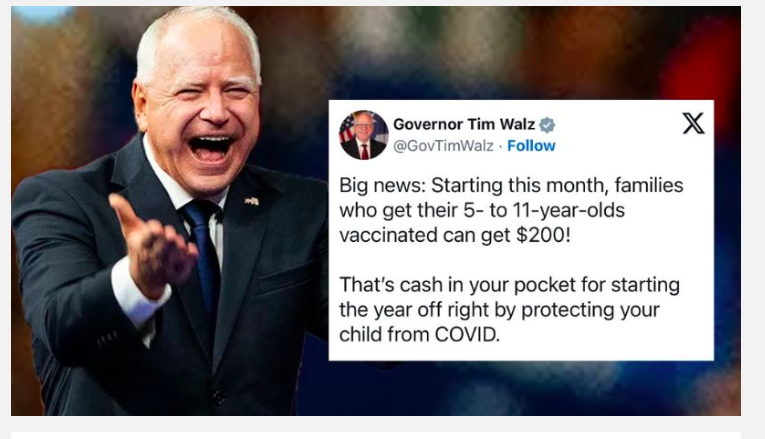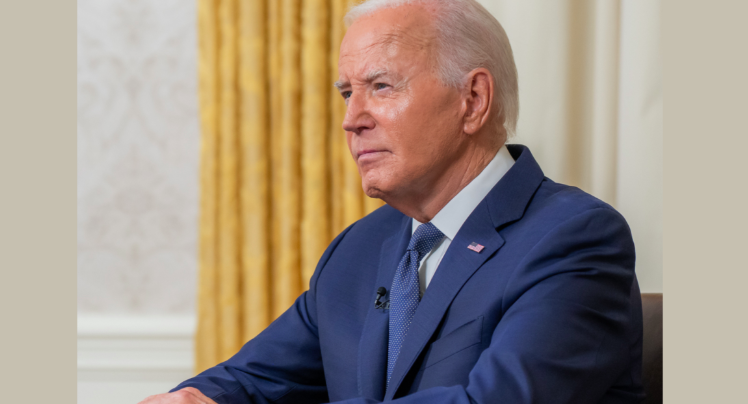Tim Walz’s Cash Incentive Program Raises Concerns Over Covid Vaccinations for Children
In a controversial move, Minnesota Governor Tim Walz implemented a cash incentive program in 2021 aimed at encouraging parents to vaccinate their children against COVID-19. The initiative, which offered financial rewards to parents of children as young as five, has raised significant concerns among conservative voices. Critics have questioned the ethics behind using taxpayer dollars to persuade parents into vaccinating their children, framing the initiative as a form of coercion.
Covid Vaccination for Children
In November 2021, Minnesota children aged 5 to 11 became eligible to receive the COVID-19 vaccine under the Biden administration’s broader vaccination campaign. Governor Walz followed this announcement with an incentive program designed to accelerate the vaccination rate among younger children. The incentives included a $200 Visa gift card for each child who received their first vaccine dose by the end of the year, in addition to being entered into a drawing for a $100,000 college scholarship .
Walz promoted the program as part of his strategy to keep schools open and protect families. He stated, “Vaccines are the way we get out of this pandemic… we need our kids to be protected and to keep them safe.” However, this program drew sharp criticism from opponents who argued that the decision to vaccinate should be based on informed consent, not monetary rewards .
Ethical Concerns Over Coercion
For many parents, the introduction of cash incentives in a sensitive health matter like vaccinating children added to an already contentious debate. Some conservatives have argued that this tactic crossed an ethical line, equating the incentives to a form of bribery. The push to vaccinate children, who are at relatively low risk of severe illness from COVID-19, according to CDC data, compounded concerns that the government was overreaching.
A growing number of critics have expressed skepticism about the necessity and safety of vaccinating young children, citing emerging data on vaccine side effects. Many questioned whether Walz’s government should be playing a role in pressuring parents to make health decisions for their children. The use of financial incentives to nudge families into action was interpreted as an underhanded move, prioritizing political objectives over the well-being of children .
From a conservative viewpoint, this policy highlights a broader pattern of government overreach during the pandemic. Many argue that parents should have the freedom to make medical decisions for their families without financial enticements from the government. “This is not how public health should work,” one critic commented, echoing concerns shared by a significant portion of Minnesota’s residents who felt alienated by these policies .
Financial Impact on Taxpayers
The financial ramifications of this initiative also sparked concern. Critics pointed out that the cash rewards program drew from taxpayer dollars, which were allocated for pandemic relief efforts. At a time when many families were struggling economically, the idea of funneling public funds into vaccine incentives for children struck some as an inappropriate use of resources. This has fed into broader frustration over how federal and state governments handled pandemic relief money, leaving many to wonder whether such programs were effective or necessary.
Opponents also noted that financial incentives in healthcare policies could set a troubling precedent. While incentivizing vaccines may have increased vaccination rates in the short term, many questioned the long-term consequences of such a strategy, particularly when it involves children’s health.
Public Backlash and Parental Rights
As the debate around the COVID-19 vaccine remains highly divisive, Walz’s incentive program has intensified the larger conversation about parental rights and government intervention. The decision to vaccinate a child, many conservatives argue, should be left to parents and medical professionals, without the influence of monetary incentives. The cash rewards program was seen as an inappropriate government intrusion into family decision-making.
Walz’s defenders argue that the incentives were necessary to curb the spread of COVID-19, which had significantly impacted school attendance and learning outcomes. However, this explanation has done little to placate critics, who view the entire vaccination push as excessive, particularly when aimed at young children who face minimal risk from the virus .
The controversy over Governor Walz’s cash-for-vaccination initiative underscores the deepening divide in public health policy approaches. As more parents and critics speak out against these tactics, it is clear that the debate over COVID-19 vaccinations for children remains far from resolved.



Again?